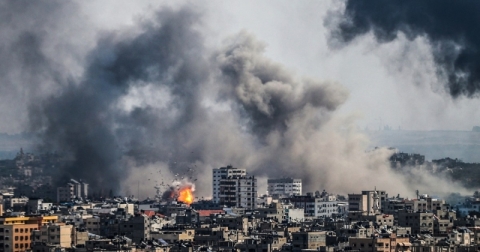Politics
UN world Court issues appeal calling for prevention of genocidal acts in Gaza
Provisional measures in the case
USPA NEWS -
The International Court of Justice (ICJ) on Friday declared that Palestinians had a right to be protected from acts of genocide, calling on Israel to “take all measures within its power” to prevent such actions and allow the entry of desperately needed humanitarian aid into the war-shattered enclave.
Reading out the order at the Peace Palace in The Hague – in response to allegations of genocide against Israel by South Africa, which Israel denies ICJ President Joan Donoghue also called for the release of all remaining hostages taken from Israel during the Hamas-led attacks on Israeli communities in which some 1,200 people were massacred on October 7. There was no explicit call for an immediate halt to Israel’s full-scale military operation in the Strip which is believed to have left more than 26,000 dead, according to Gaza health authorities.
Highlighting that the ICJ was “acutely aware of the extent of the human tragedy unfolding in the region” since war erupted in Gaza, Judge Donoghue said that the Court remained “deeply concerned about the continuing loss of life and human suffering”.
South Africa’s case
In its case, which began earlier this month in the Hague, South Africa asked the Court – a principal organ of the UN – to indicate provisional measures in order to “protect against further severe and irreparable harm to the rights of the Palestinian people under the Genocide Convention”. Among the measures South Africa asked for was the immediate suspension of military operations by Israel in the Strip, and that its forces take “all reasonable measures” to prevent genocide.
South Africa also asked the world Court to order Israel to prevent forced displacement, allow adequate food and water to reach civilians and ensure that evidence of any potential genocide is preserved. Provisional measures are a type of temporary injunction or holding measure ahead of a final decision on the dispute. It is likely to take years before a judgement is reached. The measures are considered “mandatory for implementation”, but the Court has no means of enforcing them.
Israel argued in presenting its case that the war on Hamas was one purely of defence and “not against the Palestinian people”. Lawyers for Israel said that provisional measures, if granted, would amount to “an attempt to deny Israel its ability to meet its obligations to the defense of its citizens, to the hostages and to over 110,000 displaced Israelis”.
Detailing the provisional measures that Israel should implement, the ICJ judge noted that both South Africa and Israel were States parties to Genocide Convention and therefore had agreed “to prevent and to punish the crime of genocide”.
Quoting Article 2 of the key international treaty signed in the aftermath of the Second World War, Judge Donoghue explained that genocide was defined as “acts committed with an intent to destroy, in whole or in part, a national, ethnical, racial or religious group”. The two-million-strong Palestinian population did indeed constitute a distinct group in the court’s view, she said.
Turning to the Article 3 of the Genocide Convention which prohibits “conspiracy to commit genocide” and public incitement to commit genocide, the judge said that the ICJ had taken note of a number of statements made by senior Israeli officials. These included comments by Yoav Galant, Defense Minister of Israel, who reportedly told troops on the border with Gaza that they were fighting “human animals” who were the “ISIS of Gaza”.
Liability for this article lies with the author, who also holds the copyright. Editorial content from USPA may be quoted on other websites as long as the quote comprises no more than 5% of the entire text, is marked as such and the source is named (via hyperlink).






